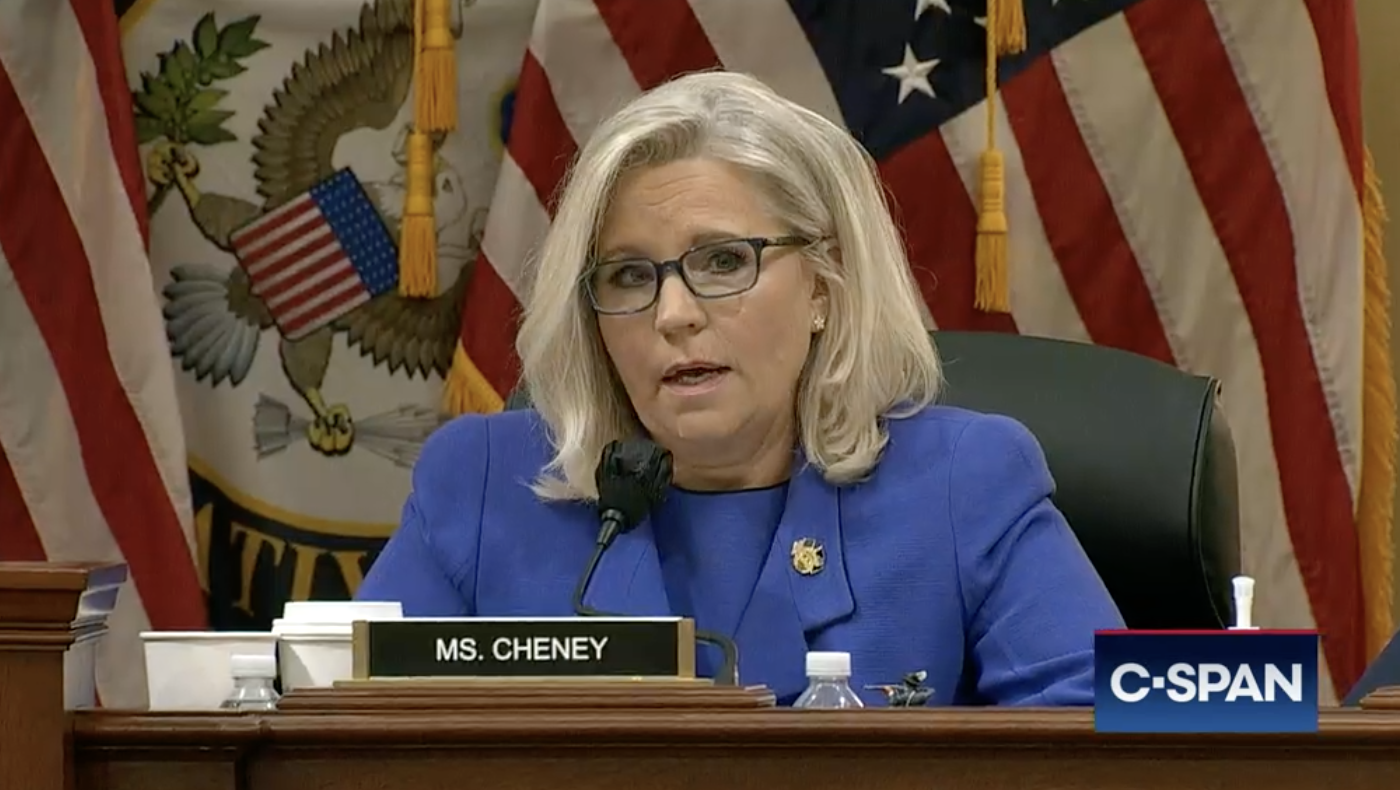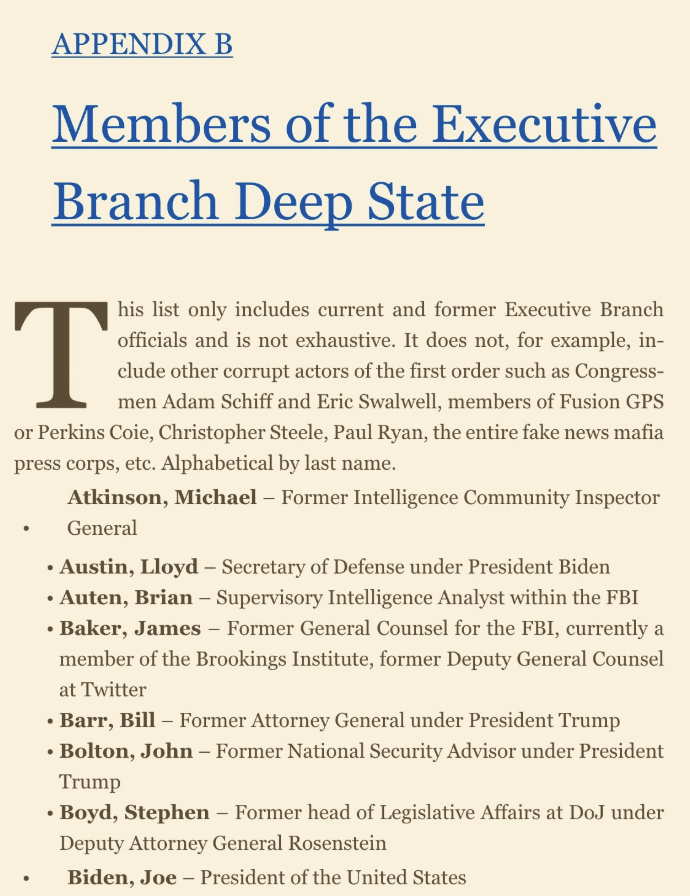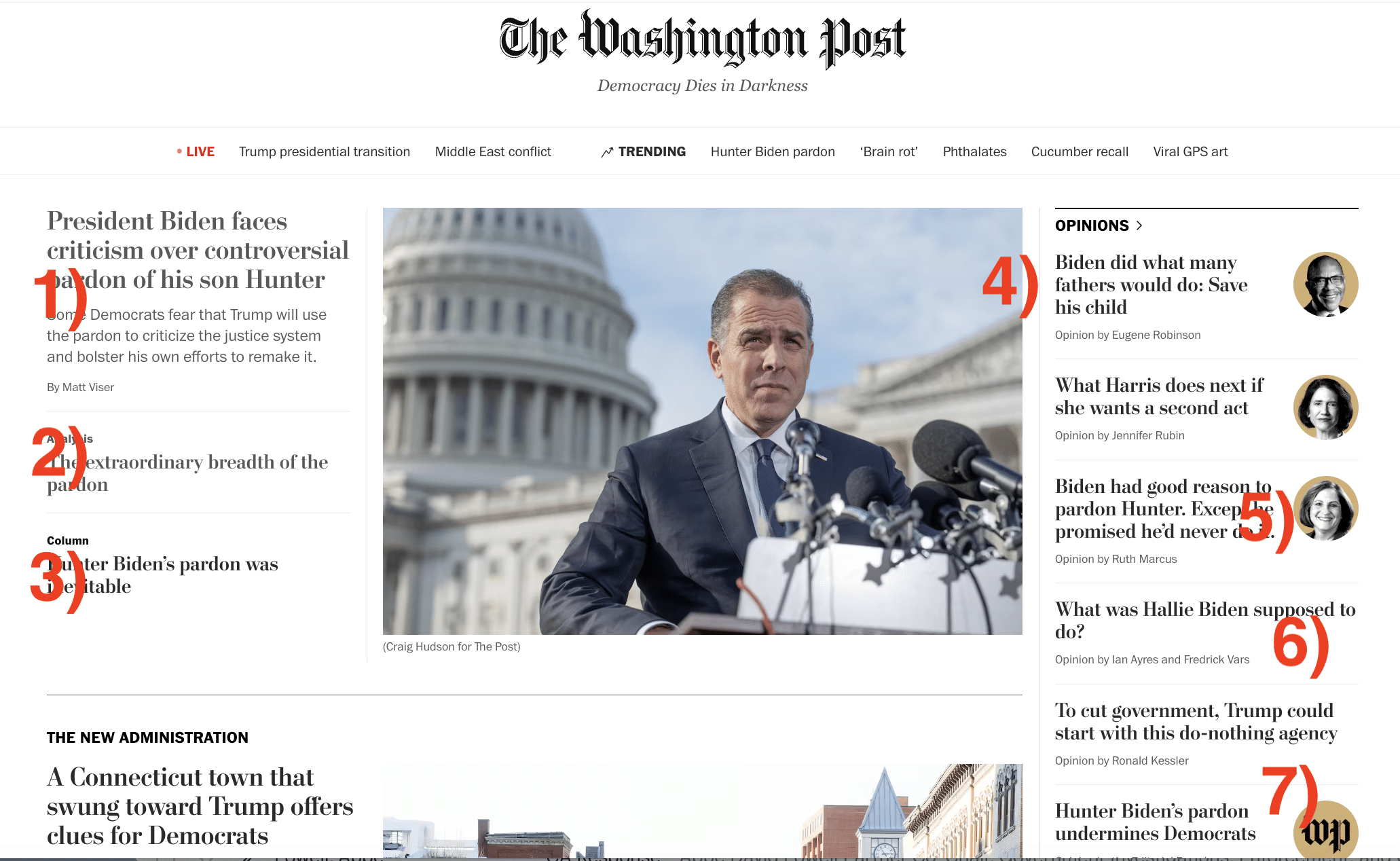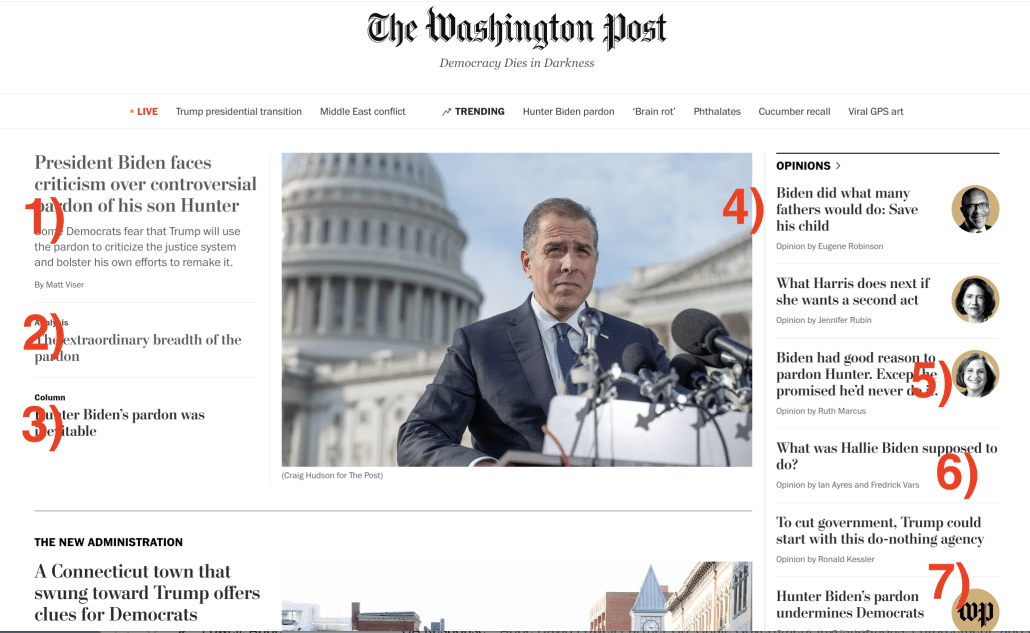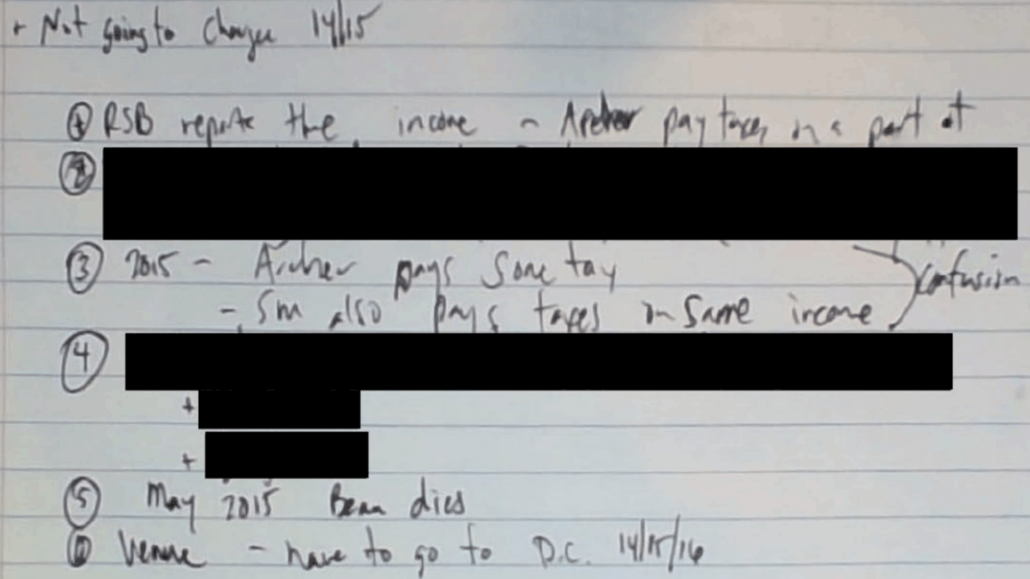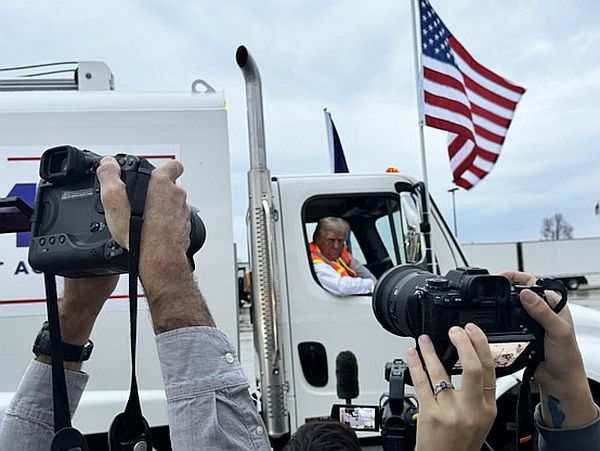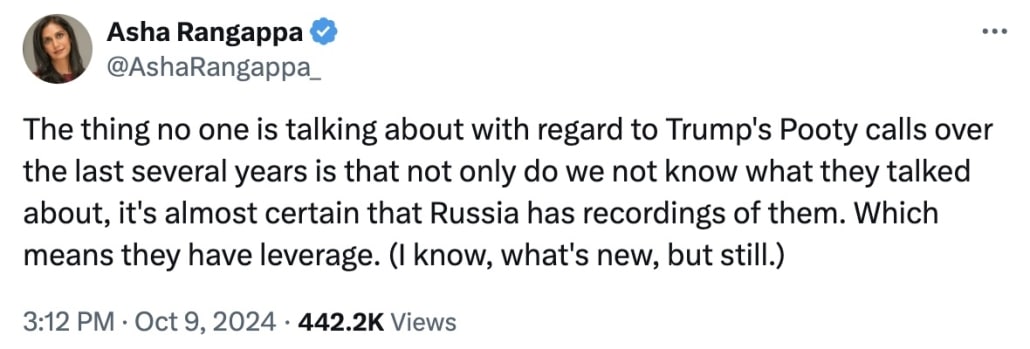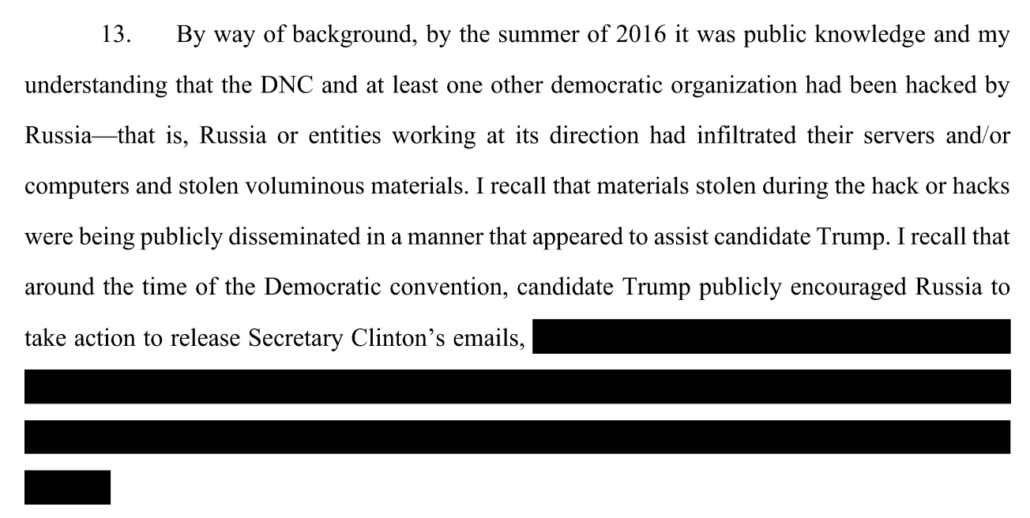Cotton Swabs and Grievance Myths: Do Not Invite Republicans to Express Support for Kash Patel’s Witch Hunts
I want to elaborate on some points I made in a Bluesky exchange I had with Greg Sargent about his post on the Barry Loudermilk report referring Liz Cheney for investigation yesterday. It was, I hope, a civil and substantive exchange (multiple people have mentioned it since), and for that I want to thank Sargent.
But I wanted to explain some points I tried making at more length.
Sargent’s post noted — and he’s right — that Trump’s embrace of Loudermilk’s report discredits false assurances Senate Republicans have offered that Kash Patel won’t pursue political witch hunts if confirmed as FBI Director.
Barely moments after Donald Trump announced that he’d chosen loyalist Kash Patel as FBI director, Republicans stampeded forth to insist that this in no way means Trump will unleash law enforcement on his enemies, even though Trump himself has threatened to do so. Senator John Cornyn suggested such threats were only for “public consumption.” Senator Rick Scott said Trump is “not gonna do it.” And Representative Dan Meuser scoffed that the very idea is “nonsense.”
These lawmakers should take a moment to consult Trump’s Truth Social feed. At 3:11 a.m. on Wednesday, demonstrating characteristic emotional balance, Trump posted this reaction to a new report from a House subcommittee chaired by GOP Representative Barry Loudermilk, which recommends that the FBI investigate former GOP Representative Liz Cheney over her role in the House’s January 6 inquiry:
Liz Cheney could be in a lot of trouble based on the evidence obtained by the subcommittee, which states that “numerous federal laws were likely broken by Liz Cheney, and these violations should be investigated by the FBI.” Thank you to Congressman Barry Loudermilk on a job well done.
Note the trademark mobspeak here: Cheney could be in a lot of trouble for federal lawbreaking, Trump declares, as if he’s merely a passive observer remarking on the danger she faces, rather than someone who will control the nation’s sprawling federal law enforcement apparatus in just over a month. Trump has been raging at Cheney for years and has amplified suggestions that she should face televised military tribunals.
Now, in a dark turn in this whole farcical saga, Trump is pretending that House Republicans have given him a legitimate basis for prosecuting Cheney, when in fact their claims were cooked up in bad faith for precisely that purpose.
Sargent argues that the press should “hound[ GOP Senators] mercilessly” on whether they’ll still support Kash after Trump’s endorsement of Loudermilk’s report.
Trump’s veiled threat toward Cheney should prompt the press to revisit those reassurances from Republicans. GOP senators should be hounded mercilessly by reporters on whether they’ll knowingly support Patel now that Trump has made the corrupt reality of the situation so inescapably, alarmingly clear.
If we lived in a world where Republican hypocrisy could be shamed, where journalists had the skill to manage such an exchange, that would be worthwhile.
We don’t live in that world.
Trying to budge Republicans from their reassurances would backfire.
Here’s why.
First, consider the utter incompetence of most journalists this side of Mehdi Hasan to handle such an exchange.
I’ve been tracking a right wing technique I’ve dubbed “Cotton swabs” (because Tom Cotton is a skilled practitioner in the technique). In it, when Republicans get asked these kind of gotcha questions by Manu Raju in the hallway or by Kristen Welker on a Sunday show, they instead flip the gotcha on its head, using it as an opportunity to air unrebutted propaganda. And the journalist is left as a discredited prop in Trump’s assault on the press.
For example, when Welker recently asked Trump if he would, in the interest of unifying the country, concede he lost the 2020 election, Trump not only refused to concede he lost, but he used the question to blame Biden that the country was divided, and then — with absolutely no pushback from Welker — lied about Joe Biden weaponizing DOJ to go after him, Trump. (The exchange introduced precisely the same kind of false reassurance that Sargent called out.)
KRISTEN WELKER:
Yes. And sir, I don’t have to tell you this, because you’ve talked about it. It comes at a time when the country is deeply divided, and now you’re going to be leading this country for the next four years. For the sake of unifying this country, will you concede the 2020 election and turn the page on that chapter?
PRESIDENT-ELECT DONALD TRUMP:
No. No, why would I do that? But let me just tell you —
KRISTEN WELKER:
You won’t ever concede —
PRESIDENT-ELECT DONALD TRUMP:
– when you say the country is deeply divided, I’m not the president. Joe Biden is the president.
KRISTEN WELKER:
But you’re going to be the president.
PRESIDENT-ELECT DONALD TRUMP:
No, no. I’m not the president. So when you say it’s deeply divided, I agree. But Biden’s the president, I’m not. And he has been a divider. And you know where he divided it more than anything else, and it probably backfired on him. I think definitely is weaponization. When he weaponized the Justice Department and he went after his political opponent, me. He went after his political opponent violently because he knew he couldn’t beat him. And I think it really was a bad thing, and it really divided our country.
So instead of giving the harmless concession she invited, that Trump lost to Joe Biden in 2020, Trump instead hijacked Welker’s platform to lie about being a victim. She asked for something to support unity. He stoked division more, blaming the polarization of the country on Biden. Then he made false claims of grievance.
It had exactly opposite effect Welker imagined. And in the fact check NBC did after the interview? Trump’s lie about Biden weaponizing DOJ went unmentioned.
NBC treated it, a brazen lie, as if it were true.
If you want to know how Trump got elected even after being charged in two federal indictments, you might start with the way that every legacy media outlet lets lies like this go uncontested.* Always. Trump never gets fact checked on his false claims about the federal investigations into his attempted coup and stolen documents.
As a result, even newsies who watch mainstream Sunday shows might be forgiven for believing the cases against Trump were ginned up, to say nothing of the judges and lawyers, from Aileen Cannon to Bill Barr to Sam Alito, who instead pickle their brains with the propaganda on Fox News.
If journalists don’t fact check these false claims, where would voters learn differently? Where would your average voter learn that the investigations against Trump were just?
Sometimes Cotton swabs involve speaking over the questioner (a favorite technique of JD Vance [see update below for an example] and Marco Rubio). Sometimes it involves flipping the entire premise of the question. It always involves, first, a shameless refusal to disavow the outrageous Trump practice or statement. As such, these are performative moments of obeisance, reinforcing Trump’s power and the assault on truth he demands.
And on questions regarding Trump’s troubled relationship with rule of law, it always involves false claims about past DOJ practice, either denials he politicized DOJ or false claims it was politicized against him. Sometimes both!
Trump and his allies have used Cotton swabs to sneak hundreds — probably thousands — of false claims that he, and not his adversaries, was a victim of politicized prosecution onto purportedly factual news outlets with no pushback.
None.
Indeed, at least one of the underlying examples of Republicans giving reassurances about Kash that Sargent cited was itself a Cotton swab. Rick Scott didn’t just say that Trump wouldn’t launch investigations in his second term, the part Sargent quoted, he premised his answer on a false claim that Trump didn’t do so in his first term (a very common claim among Trump’s most loyal allies).
“He didn’t do it the first time. He’s not gonna do it this time,” Scott said. (Trump actually did press for prosecutions of his enemies during his first term, such as by publicly musing there should be probes of former Democratic presidential candidate Hillary Clinton, and he also pushed for a criminal investigation into a previous investigation of his 2016 campaign.)
Even with Arthur Delaney’s fact check (a rarity in the reporting of Cotton swabs), HuffPo didn’t note that Trump did more than simply demand investigations of his adversaries, he got them. A key prong of the John Durham investigation chased possible Russian disinformation exacerbated by Durham’s own fabrications to criminalize Hillary’s use of oppo research. And both Durham’s indictments presented dodgy false statement accusations as conspiracies extending to the Hillary campaign. Trump’s DOJ set up a side channel via which Biden was framed — a false allegation used to ratchet up felony charges against his son. And there’s a long line of investigations — IRS audits, DOJ IG investigations used to fire people without due process, US Attorneys ordered to pursue special investigations (including another one targeting Hillary) — that targeted Trump’s enemies.
Trump’s administration targeted his enemies all the time, via a variety of means. And yet that gets buried in the HuffPo report. What should have been an opportunity to debunk Scott’s premise was, even from a diligent journalist, an exchange that still obscured how systematically Trump politicized rule of law in his first term.
And these Cotton swabs are part of a larger process, the extended con via which Trump has gotten Republicans to hate rule of law that LOLGOP and I have been tracing in the Ball of Thread podcast. Rather than treating the Russian investigation as a welcome review of four associates all of whom were monetizing their access to Trump with foreign countries, he instead latched onto false claims he was wiretapped, making himself a victim. With the help of Kash Patel, Trump substituted the Steele dossier for the real substance of the Russian investigation, convincing most Republicans that the investigation started not from the Trump campaign’s foreknowledge of the Russian attack on Hillary, but instead from Hillary’s attempt to understand Trump’s unabashed Russian ties — that oppo research Durham would criminalize. Trump then turned on the FBI, claiming that a bunch of people who were just trying to protect the country from an attack by a hostile country were instead targeting him personally; the myth that FBI targeted him is precisely what John Cornyn internalized when he attributed his support for Kash because Kash planned, “to restore the FBI to its former reputation as a nonpartisan, no political institution, and he told me he agreed” (also part of the Delaney story). Via both his own propaganda and the Durham investigation designed to flip the script on Hillary, Bill Barr reinforced that myth of Trump grievance. And all that while the entire Republican party responded to Trump’s extortion of Ukraine by relentlessly pursuing Joe Biden’s kid to the exclusion of pursuing policy, using a fabricated bribery allegation to ratchet things up before their rematch. Think about that! Trump dodged his first impeachment by ginning up a politicized investigation of Biden and his kid, and that entire process has been memory holed!
Gone!
Poof!
And while LOLGOP and I still have several episodes to do, it is no accident that the same team that turned a hard drive of Hunter’s dick pics — a relentless campaign of revenge porn — into yet another claim that poor Donald Trump was the victim, it is no accident that that very same team turned immediately to using the Big Lie to attack the foundations of American democracy. And Trump did it again when he beat the second (impeachment) and third (criminal indictment) attempts to hold him accountable. The price of admission in today’s GOP is these moments of performed fealty, the willingness to use legitimate questions about the politicized justice Kash has promised to instead publicly adopt Trump’s false claims that he is a victim.
The entire GOP is currently built around this myth of grievance. It gets reinforced with every Cotton swab. It was Trump’s platform during the election. It was the lie he used to make a bunch of disaffected Americans believe they had something in common with a billionaire grifting off their vulnerabilities.
This is the core of Trump’s super power, the claims of grievance he manufactures to justify his assault on rule of law.
The last thing you should want is for journalists to rush out to give Republican Senators yet another opportunity to perform their obeisance to Trump and his false myths of grievance, because all it will do is reinforce the polarization Trump thrives on and do further damage to truth and rule of law.
If we’re going to break this spell, we need to go about it a different way, some of which Sargent and I also discussed with respect to Kash, some of which I laid out in an earlier post responding to something Sargent wrote.
You are not going to defeat a Kash Patel or Pam Bondi nomination by asking for promises about political investigations. As I noted in that earlier post, Democrats (and even Lindsey Graham) attempted that approach with Bill Barr, and he proceeded directly from his confirmation to turn DOJ into a propaganda factory, down to the fabricated bribery allegation against Joe Biden.
Leave the direct assault on Kash to Olivia Troye (if she remains willing), to whom Kash already provided opportunity to talk not about his past role in abusing rule of law for Trump, but instead about how he lied to the people who relied on him, up to and including Mike Pence. Troye gives Republicans reason to oppose Kash because he has harmed Republicans. If you instead focus on Kash’s past and promised politicization, you’ll just trigger more obeisance to Trump’s myth of grievance.
Luckily, with Kash, there are other ways to get at this.
The question that kicked off the entire exchange between Sargent and me, for example, was about Speech and Debate, which should protect Liz Cheney from any scrutiny even if the false claims alleged in the Loudermilk report were true. Raising the Loudermilk referral as a question about Speech and Debate has the advantage of addressing the one area that has gotten Republicans to stand up to Trump, their own prerogatives (for example, by defending advice and consent on nominations). Questions about Speech and Debate would provide cause to raise the opinion — written by Trump appointee Neomi Rao, with a concurrence from former Trump White House Counsel Greg Katsas — that extended Speech and Debate protection to Scott Perry’s plotting on the Big Lie and affirmed its application in less formal situations than Liz Cheney’s communication with Cassidy Hutchinson at the core of Loudermilk’s report.
The district court, however, incorrectly withheld the privilege from communications between Representative Perry and other Members about the 2020 election certification vote and a vote on proposed election reform legislation.
Does Kash know better than Neomi Rao about Liz Cheney’s immunity from this kind of investigation, he should be asked (whether Rao or Kash is a bigger nutball is admittedly a close question, but one that can sow some useful discomfort). Questions to Kash about whether Speech and Debate defeats Loudermilk’s referral would have a very different valence than questions about politicization, because they would carry with them the implication that if Kash can investigate Liz Cheney and Adam Schiff, Mitch McConnell will be next.
Plus, they provide cause to focus on something Senators should address anyway: Kash’s lawsuit against DOJ for his own subpoena. In addition to claiming that the subpoena targeting him and others (including Adam Schiff, though he neglected to mention that) was “a chilling attempt to surveil the person leading the Legislative Branch’s investigation into the Department of Justice’s conduct,” something also included in the scope of the January 6 Committee, Kash also made preposterous claims about the standard for subpoenas (which is why it was dismissed unceremoniously in September).
Even Kash’s legally illiterate claims won’t disqualify him with Republican Senators, but raising them gets him on the record as to his understanding of the law before he signs a bunch of orders adopting wildly different standards targeting Trump’s adversaries. Kash has made expansive claims about privacy rights and right of redress against the federal government. Fine. Let’s make aspiring FBI Director Kash Patel adhere to that standard.
But they also provide a way to point out that Kash’s targets actually aren’t Trump’s targets. Many of those on his enemies list, for example, are people, like Rod Rosenstein (the real target of Kash’s lawsuit) against whom he’s got a grudge. Trump and GOP Republicans don’t give a damn if Kash pursues Trump’s enemies. Either they’re too cynical to care, or they believe — or have to feign that they believe — that Trump’s enemies have it coming. But if Kash turns the FBI into his own personal fiefdom? Too many Republicans have been at odds with Kash to abide by that.
Finally, there’s the point I made about the Loudermilk report, after actually taking the time to read it (which no one else seems to have done). In the 39 pages of his report dedicated to DOD’s inaction, Loudermilk gets vanishingly close to accusing then Acting Secretary of Defense Christopher Miller of criminal insubordination for not deploying 10,000 members of the National Guard on January 6.
President Trump instructed the highest-ranking Pentagon official to use any and all military assets to ensure safety three days prior to January 6, 2021. The Acting Secretary of Defense concedes that external variables, such as the “Twitter sphere”, accusations of being a “Trump crony” and Representative Cheney’s Op-Ed, weighed on his mind as he determined how and whether to employ the National Guard on January 6, 2021. During this period of time, Acting Secretary Miller published his January 4 memo, with significant restrictions and control measures on the DCNG.
To date, no investigation or disciplinary action has taken place against Acting Secretary of Defense Miller for his failure to follow directives from the sitting Commander-in-Chief on January 3, 2021.
Loudermilk sources this accusation in DOD IG’s own investigation of their inaction for some very good reasons. First, the January 6 Committee revealed that what really happened is that a bunch of Trump loyalists, up to and including Mark Meadows, scoffed at the notion that Trump would march to the Capitol protected by 10,000 National Guard troops. More importantly, Kash Patel’s claims about his own involvement in this process put him right there at Miller’s side, part of the same insubordinate inaction. That’s a fiction Loudermilk needed to spin. It’s a fiction even more outrageous than his referral of Liz Cheney.
But it’s also a referral that implicates Trump’s pick for FBI Director personally. Did Kash fail the President? Or did he instead join everyone else in recognizing what it would mean for Trump to march to the Capitol?
A damn good question for a confirmation hearing.
Kash Patel’s own big mouth, past actions, and wacky legal claims provide ample material to create friction between him and Senate Republicans guarding their own prerogatives. That’s almost certainly not enough to sink his nomination, though it would be more effective than inviting Republicans to reaffirm their belief in Trump’s grievance myth. But questions about such topics may provide better material going forward to box him in.
About one thing I’m certain, though: you will get nowhere if you make this a loyalty contest. You will get nowhere if you keep framing this as an opportunity for Republicans to either reaffirm that loyalty oath, even if it entails a direct assault on rule of law, or invite an attack on themselves personally.
Virtually all GOP Senators will find a way to back Trump and his assault on rule of law. Every single time.
And given the inept media we’ve got right now, it will serve only to do more damage, reinforcing Trump’s conceit that the law is just a matter of political loyalty.
Do not give Republicans an opportunity to condemn or endorse Kash Patel’s witch hunt against Trump’s enemies. It’s the quickest way to ensure they remain unified in supporting him.
*The night after I wrote this, I woke up and remembered that CNN’s Daniel Dale had written a fairly extensive fact check about Trump going after his adversaries. The exchange with Martha Raddatz he responded to was a good example of how JD Vance talks over people to deliver his Cotton swabs, filibustering to prevent any rebuttal.
RADDATZ: Would Donald Trump go after his political opponents?
VANCE: No —
RADDATZ: He suggested that in the past.
VANCE: Martha, he was president for four years and he didn’t go after his political opponents.
You know who did go after her political opponents? Kamala Harris, who has tried to arrest everything from pro-life activists to her political opponents —
(CROSSTALK)
RADDATZ: He said those people who cheated would be prosecuted.
VANCE: — and used the Department of Justice as a weapon against people — well, he said that people who violated our election laws will be prosecuted. I think that’s the administration of law. He didn’t say people are going to go to jail because they disagree with me. That is, in fact, been the administration and the policy of Kamala Harris, Martha.
Look, under the last three-and-a-half years, we have seen politically-motivated after politically-motivated prosecution. I’d like us to just get back to a system of law and order where we try to arrest people when they break the law, not because they disagree with the prevailing opinion of the day, and there’s a fundamental difference here between Donald Trump and Kamala Harris. Donald Trump may agree — agree or disagree on a particular issue, but he will fight for your right to speak your mind without the government trying to silence you.
Kamala Harris is explicitly —
RADDATZ: Senator Vance, I —
(CROSSTALK)
VANCE: — censorship of folks who disagree with her.
RADDATZ: I want to go back to Donald Trump.
(CROSSTALK)
In response to Dale’s fact check, Trump’s campaign accused the media of a double standard because DOJ hadn’t indicted Biden or Hillary for their non-crimes.
Trump made extensive behind-the-scenes efforts to get his political opponents charged with crimes. But you don’t have to rely on investigative reporting or the memoirs of former administration officials to know that Trump went after political opponents as president.
He often went after them in public, too.
As CNN reporter Marshall Cohen has noted, there is a long list of political opponents whom Trump publicly called for the Justice Department and others to investigate or prosecute. The list includes not only 2016 election opponent Hillary Clinton and 2020 election opponent Joe Biden but also Biden’s son Hunter Biden, Democratic former Secretary of State John Kerry, Trump’s former national security advisor turned critic John Bolton, Democratic former President Barack Obama, unspecified Obama administration officials, the anonymous author of a New York Times op-ed by a Trump administration official critical of Trump, MSNBC host and Trump critic Joe Scarborough, former FBI director turned Trump critic James Comey, other former FBI officials, former British spy Christopher Steele (the author of a controversial dossier of allegations against Trump), and various congressional Democrats – including former House Speaker Nancy Pelosi, Rep. Adam Schiff of California, Rep. Ilhan Omar of Minnesota, Sen. Richard Blumenthal of Connecticut, and Sen. Mark Warner of Virginia.
Asked for comment for this article on Monday, Vance spokesperson Taylor Van Kirk accused the media of having a biased “double standard” and said “it is indisputable that under Kamala Harris and Joe Biden’s DOJ, the Republican nominee for president was targeted and indicted, while under President Trump, nothing like that ever transpired against either of the Democrats he faced off with in 2016 or 2020.”
But that wasn’t for a lack of Trump trying.
Trump repeatedly pressured the Justice Department as president to prosecute both Clinton and Biden, in addition to trying to get foreign countries to investigate Biden. That the Trump-era Justice Department declined to charge Clinton and Biden doesn’t mean it’s true that Trump didn’t “go after” them or others. (In fact, Trump literally said in 2017 that he wanted the department to be “going after” Clinton.) [my emphasis]
But even Dale, the best in the business, made no mention of how aggressively Durham investigated Hillary and her campaign and ignored that the Brady side channel led directly to the elevation of Alexander Smirnov’s attempt to frame Joe Biden, which had a role in David Weiss’ elevation as Special Counsel, which led to the felony conviction of Hunter [Dale relies heavily on CNN’s Marshall Cohen, who got the Durham investigation wildly wrong].
In 2019, Barr satisfied Trump’s investigate-the-investigators demand by tasking a federal prosecutor to help investigate the origins of the FBI’s probe related to Russia and the 2016 election. In late 2020, with about three months left in Trump’s presidency, Barr gave that prosecutor, John Durham, the status of special counsel.
And in early 2020, Barr tasked a different federal prosecutor with taking in information from members of the public, notably including then-Trump lawyer Rudy Giuliani, related to allegations about the Bidens and Ukraine, which had been a subject of Trump’s public and private focus.

